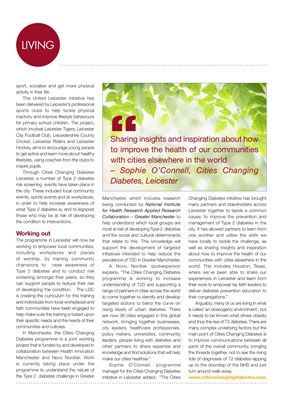
LIVINGLIVING
sport, socialise and get more physical
activity in their life.
The United Leicester initiative has
been delivered by Leicester's professional
sports clubs to help tackle physical
inactivity and improve lifestyle behaviours
for primary school children. The project,
which involves Leicester Tigers, Leicester
City Football Club, Leicestershire County
Cricket, Leicester Riders and Leicester
Hockey, aims to encourage young people
to get active and learn more about healthy
lifestyles, using coaches from the clubs to
inspire pupils.
Through Cities Changing Diabetes
Leicester, a number of Type 2 diabetes
risk screening events have taken place
in the city, including at local community
events, sports events and workplaces, in
order to help increase awareness of what
Type 2 diabetes is, and to signpost those
who may be at risk of developing the
condition to interventions.
Working out
The programme in Leicester will now be
working to empower local communities,
including workplaces and places
of worship, by training community
champions to raise awareness of
Type 2 diabetes and to conduct risk
screening amongst their peers, so they
can support people to reduce their risk
of developing the condition. . The LDC
is creating the curriculum for this training
and individuals from local workplaces and
faith communities have been engaged to
help make sure the training is based upon
their specific needs and the needs of their
communities and cultures.
In Manchester, the Cities Changing
Diabetes programme is a joint working
project that is funded by and developed in
collaboration between Health Innovation
Manchester and Novo Nordisk. Work
is currently taking place under the
programme to understand the nature of
the Type 2 diabetes challenge in Greater
Manchester, which includes research
being conducted by National Institute
for Health Research Applied Research
Collaboration - Greater Manchester to
help understand which local groups are
most at risk of developing Type 2 diabetes
and the social and cultural determinants
that relate to this. This knowledge will
support the development of targeted
initiatives intended to help reduce the
prevalence of T2D in Greater Manchester.
A Novo Nordisk spokesperson
explains, "The Cities Changing Diabetes
programme is working to increase
understanding of T2D and supporting a
range of partners in cities across the world
to come together to identify and develop
targeted actions to bend the curve on
rising levels of urban diabetes. There
are now 36 cities engaged in this global
network, bringing together businesses,
city leaders, healthcare professionals,
policy makers, universities, community
leaders, people living with diabetes and
other partners to share expertise and
knowledge and find solutions that will help
make our cities healthier."
Sophie O'Connell, programme
manager for the Cities Changing Diabetes
initiative in Leicester added, "The Cities
Changing Diabetes initiative has brought
many partners and stakeholders across
Leicester together to tackle a common
cause; to improve the prevention and
management of Type 2 diabetes in the
city. It has allowed partners to learn from
one another and utilise the skills we have
locally to tackle the challenge, as well as
sharing insights and inspiration about how
to improve the health of our communities
with cities elsewhere in the world. This
includes Houston, where we been able
to share our experiences in Leicester and
learn from their work to empower lay faith
leaders to deliver diabetes prevention
education to their congregations. "
Arguably, many of us are living in what
is called 'an obesogenic environment', but
it needs to be known what drives obesity
and thus the rise of T2 diabetes. There are
many complex underlying factors but the
main point of Cities Changing Diabetes is
to improve communications between all
parts of the overall community, bringing
the threads together, not to see the rising
tide of diagnoses of T2 diabetes lapping
up to the doorstep of the NHS and just
turn around walk away.
Sharing insights and inspiration about how
to improve the health of our communities
with cities elsewhere in the world
- Sophie O'Connell, Cities Changing
Diabetes, Leicester
"